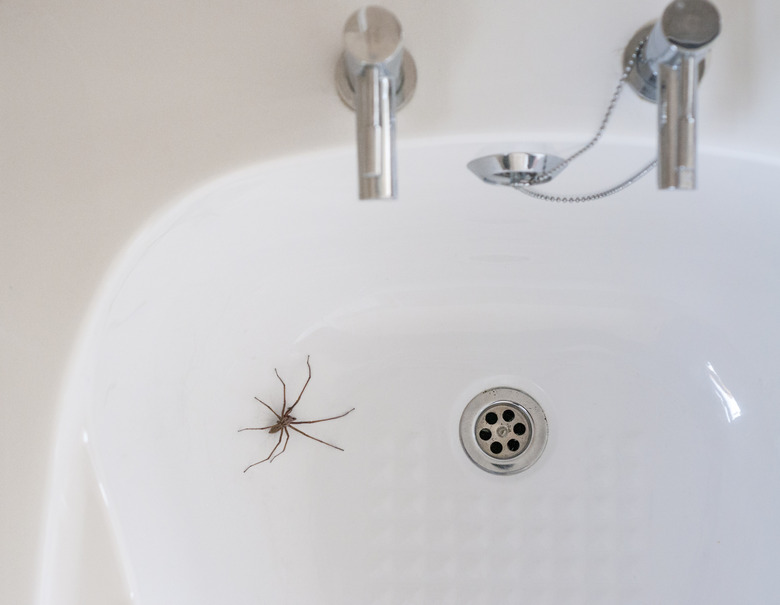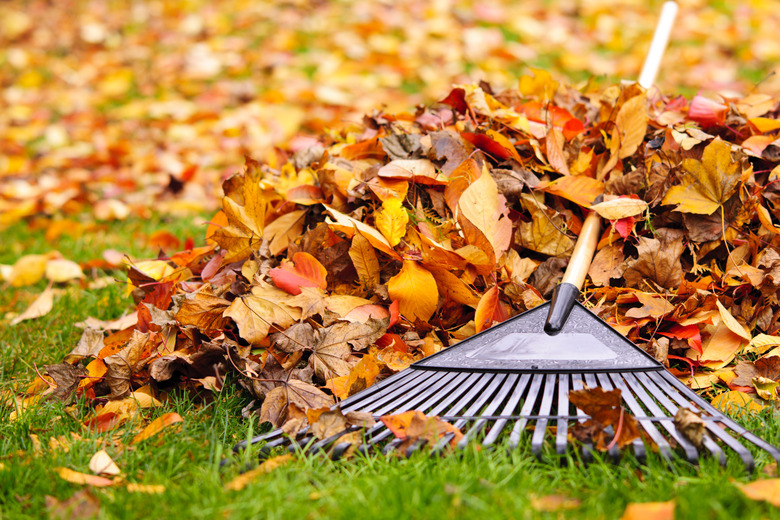11 Tips For Getting Rid Of Bugs In Your Home For Good
We may receive a commission on purchases made from links.
While most bugs aren't harmful to your health or your home, no one wants to spot a creepy crawly pest in the hallway, while they're brushing their teeth, or especially when they're preparing food. Though seeing one bug doesn't mean you have a full-on infestation, it's important to regularly implement some basic pest control strategies to prevent one in the future. Prevention is by far the most important part of eliminating bugs from your house, whether it's between scheduled routine chemical treatments or before you even see one single ant, termite, or cockroach.
Want to make bug sightings a rarity in your home? Follow these pest control tips to make your space an inhospitable environment for bugs.
1. Watch what you bring inside.
1. Watch what you bring inside.
Bugs don't always crawl in on their own. Sometimes, they're carried in. Before stepping inside your home, take a look at packages from the grocery store and examine plants from the nursery. Make a point of opening delivered packages outside (even in inclement weather) and discarding the cartons in your trash.
Take particular caution if you're buying used furniture. That antique couch you scored at an estate sale can be harboring bedbugs that are hitching a ride into new quarters for better food prospects. If you are interested in buying used, always look beneath the cushions and examine the fabric closely for any pests.
2. Keep a tidy house.
2. Keep a tidy house.
A messy house that has food spills, dirty dishes, and food items left on countertops is something akin to an all-you-can-eat buffet for that hungry cockroach or fruit fly in the corner. To avoid a pest infestation, get into the habit of cleaning up any food mess you make. Wash dishes, wipe counters, and don't leave unprocessed food waste in the garbage disposal. Keep your sink and microwave oven spotless, and clean under all appliances. Take out the trash and recycling frequently or keep the bins outside in closed containers.
To be on the safe side, establish a rule that food is not allowed in bedrooms, where half-eaten pizza and other snacks can wind up shoved beneath the bed. Store food in glass containers (which don't absorb odors) and in containers with airtight lids. Finally, vacuum floors and furniture regularly to catch the crumbs that are hard for you to see but easy for bugs to find.
3. Clean up after your pets.
3. Clean up after your pets.
As cute as they are, our pets can be messy at times. Quickly clean up after accidents happen, including food messes. Train them to eat shortly after their food is put down and then put bowls away overnight. Wash their dishes regularly and wipe up any pet food that winds up on the floor, being careful to sweep up crumbs that get scattered. If your pets eat dry food, store it in an airtight container.
4. Maintain window and door screens.
4. Maintain window and door screens.
Check all the window and storm-door screens in your house. Sometimes, just slight damage that's barely perceptible can still be big enough for little critters to sneak through. If you don't have time or money for replacement of the screens, buy a roll of screen repair tape. It looks like screening itself and can simply be cut into any suitable shape or size and placed over the damaged spots. Also, put the screens back in place as soon as you finish repairing or cleaning them or washing your windows. As much as possible, keep the windows shut until you do so.
5. Close off entry points.
5. Close off entry points.
One of the best ways to keep bugs out of the house is to ensure they don't find an opportunity to crawl in through all the dozens of tiny cracks in your doors, windows, or other points of entry. Caulk window frames and check your door fit at night from the outside when interior lights are on. If you can see light, it needs weatherstripping, a door sweep, or threshold repair.
Add a rubber seal or brush to the bottom of your garage door. Check your foundation for crevices, cracks, and holes that need sealing. Add screening to any vent openings in your foundation and attic. Inside your house, caulk the edges of fuse boxes, wall outlets, baseboards, and light switches.
6. Rob them of shelter.
6. Rob them of shelter.
Household pests are very good at finding shelter, and your job is to make sure there's no room at the inn for them, inside or out. Remove debris from your yard, including boards, leaf piles, and firewood, and clean out window wells and gutters. Firewood should never be stacked next to your house, so store it in a firewood holder that keeps it off the ground.
Kick the clutter out of your life by rooting through your house, garage, basement, and attic and tossing with a vengeance. Spiders love to hide among clutter. Old wallpaper and books make cockroaches feel right at home, and the clothes you should have donated become moth motels.
7. Eliminate water sources.
7. Eliminate water sources.
Most bugs can go without food sources for a while, but without water, they'll die within just a few days, and a nice, long drink is one of the things they're trying to find inside your home. To eliminate water sources, fix plumbing problems that create leaks or drips. If you have a wet basement, look into waterproofing, or if it simply stays humid, use a dehumidifier.
Outdoors, eradicate all sources of standing water, which serve as breeding grounds for mosquitos. These can be items like old tires, buckets, plant holders, and children's swimming pools. Refresh the water in your bird bath frequently. Keep your gutters cleaned out year-round to promote proper drainage.
8. Tend to your grass and landscaping.
8. Tend to your grass and landscaping.
How you handle things that grow outside has a big effect on pest prevention inside. To prevent pests from migrating from the yard to the house, keep your lawn tidy, and trim shrubs and tree branches so they're not touching the house. Because foundations often have cracks and crevices, clear items away from the area. For example, don't pile decorative rocks against your foundation because you can wind up with spiders nesting in your basement. Do, however, include plants elsewhere in your landscaping that are known to repel the bugs you want to send packing (like growing lavender to get rid of mosquitos).
9. Light your home’s exterior strategically.
9. Light your home's exterior
strategically.
Yellow bug lights may not give off the same attractive glow that incandescent bulbs do, but they'll keep the moths away. Recent findings show, however, that using reddish-hued LED lights outside is even more effective at keeping bugs at bay than the yellow bulbs. In addition to using either of these types of bulbs, placing exterior incandescent lighting around the perimeter of your property will serve to lure bugs away from your house.
10. Use garbage can smarts.
10. Use garbage can smarts.
If you're determined to prevent bug infestations, then you should really think over how you handle your garbage — because it's one of the prime causes of pest problems. To prevent your trash from becoming a pest lure, ensure your garbage can that has a tight-fitting lid. Don't throw in food and organic matter without sealing it securely in sturdy plastic bags (or, better yet, start composting your veggie scraps).
Even though it's convenient to toss garbage into a can that's just outside a door, keep the trash can as far from your house as you can, and never forget to move it to the curb for scheduled pickup. Wash it regularly with household detergent and bleach to clear out any remaining organic matter. If you have food waste that can't go down the disposal and you can't get out to put it in the garbage can, store it in a zip-close bag and stash it in the freezer until you can dump it.
11. Vacuum — and then vacuum more.
11. Vacuum — and then vacuum more.
Very often, you can't see all the little things around your house that spell "pest problem" — the things that bugs sense, smell, and want to eat; the things they deposit; and the things you carry in on your shoes. Then, there's the microscopic crumbs your kids drop onto the floor (perfect for a bug feast) as well as the first crop of flea eggs to fall off your pet's fur into the cracks and folds of upholstered furniture. The answer to all of these issues is simply to keep that vacuum fired up on a regular basis. (To make things even simpler, invest in a robot vacuum to do the work for you.)
Targeted vacuuming even helps to get rid of some of the small pests themselves — like ladybugs, stink bugs, ants, and fleas — before they can become a big problem. Vacuuming alone won't make your house pest free, but it's one of the most handy and beneficial pest control steps you can take.
References
- Wired: Just Give Up. It's Impossible to Bug-Proof Your Home
- University of Arizona Cooperative Extension: How To Bug Proof Your Home
- University of Tennessee Extension: Managing Pests Around the Home
- Build.com: How To Create a Bug-Free Backyard With LED Lights
- University of Wisconsin-Madison: Study Bolsters Bats' Reputation as Mosquito Devourers
- Terminix: Firewood Storage Tips to Help Keep Pests Out This Winter
- North Carolina State Cooperative Extension: The Buzz on Mosquitoes
- CockroachFacts.com: What Attracts Roaches and Why
- Tim's Pest Control: Does Vacuuming Prevent Pests?


